- Home
- Jon McGregor
If Nobody Speaks of Remarkable Things Page 3
If Nobody Speaks of Remarkable Things Read online
Page 3
All the emails I get these days start with sorry but I’ve been so busy, and I don’t understand how we can be so busy and then have nothing to say to each other.
I read the letter again, and I sat very still, barely breathing, the streetlight striping the darkening room through the blinds.
I took off my shirt and bra and began touching my skin, very slowly, tracing the contours, pressing against the ridges and lines.
Running my fingers across all the marks and scars and spots, as though I could read my blemishes like braille.
I’m not sure what I was looking for.
I think I wanted to find something new, something visibly changed, something I could point to and say this is what it is, this is where it’s beginning.
But I couldn’t find anything.
I pressed the palm of my hand against my chest and tried to count my heartbeat.
It felt faster than it should be, and my skin felt hot, shining red, as though the blood was rushing to the surface and gasping for air.
I sat there for a long time, I fell asleep in the chair and when I woke up in the morning I was late for work.
Chapter 4
In the backyard of number nineteen, a woman is hanging out her washing, murmuring a song to herself and squinting against the light. She can see people sleeping in the back room of next door, she is glad they are quiet now, it means perhaps her children will sleep more.
She stoops for a handful of pegs and adjusts her headscarf. She hangs out a row of salwar kameez in different sizes, bright swathes of colour printed on thin fabric, she hangs out shirts, trousers, endless variations of underwear. And when she is done, and the whole yard is heavy with wavering lines of wet bunting, she straightens up and puts her hand to the hollow of her back, curves her face upwards. She interrupts her murmured song and listens to the muffled rumble of the morning. She breathes slowly and deeply, and for now the air smells clean, infused with the bright wetness of clean laundry.
The young man at number eighteen, with the dry eyes, he’s not dressed yet but he’s awake and he’s busy, he’s crouched on the floor, arranging a collection of objects and papers.
A page from a TV guide. An empty cigarette packet. A series of supermarket till receipts, stapled together in chronological sequence. Leaflets advertising bhangra alldayers and techno all-nighters. Train tickets. Death notices cut from local newspapers. An unopened packet of chewing gum.
He lays them all out on the floor, lays them out in size order, rearranges them in date order, blinking quickly. He stands back and looks, and writes out a list of the objects in front of him.
He turns on the television and picks up a polaroid camera. As soon as the screen warms up he takes a photograph of it, scribbling the time and the date on the back of the blank printout, seven a.m., thirty-one, oh eight, ninety-seven.
He lays the polaroid next to the cigarette packet, watching the shapes darken into colour and light. He turns back to the television, blinking, and watches Zoe talking about pop music in a London park, the soft morning light flitting through the trees and lighting up her hair, she says we’ll be having it large and he turns the television off.
Next door, in the bedroom of number twenty, an old man is lying awake beside his sleeping wife, he is holding his cupped palms close to his face and looking at the tiny flecks of blood he’s just coughed out of his lungs. He is fighting to control his breathing without waking his wife and he is looking at the pictures of their nephews and nieces, their great-nephews and greatnieces, propped up on the dressing table. He feels old, and he feels afraid. He listens to the steadiness of his wife’s breathing, and he thinks about the first night they spent together, a smuggled liaison in a seaside hotel nearly sixty years ago. He remembers the pattern on the wallpaper, the luxury of a three-bar electric fire, the view of the hills from the window. He remembers their shyness, standing awkwardly at the foot of the small bed and reaching out very slowly, kissing once, twice, moving uncertainly to hold each other and gradually allowing their curiosity to prevail. He remembers her insisting that the light be kept on until they slept, and that their clothes be folded neatly. And most of all he remembers how wonderfully startled they both were by their eventual intimacy.
He lies still, listening to his wife, waiting for the morning.
In the attic of number twelve, a young man is leaning out of the window, stripped to the waist. He is smoking a cigarette, holding it away to one side and making sure he blows all the smoke out into the air, and he is thinking about the day ahead.
He finishes the cigarette and drops it down into the street, watching it fall, the way it glows brightly as it accelerates towards the ground, the way it bursts into sparks on the pavement below. He turns back into his room, unwrapping a stick of chewing gum from his bedside drawer, taking a wallet from under his pillow and emptying out the cash. He sits crosslegged on the bed, running a flat hand across his forehead and through his thick black hair, looking at the folded notes with a bounce and a jig of excitement. He counts the money, again, smoothing the creases, sorting the fives from the tens, stacking them in ten neat piles of a hundred pounds each. He grins, biting his lip, nodding his head and tucking the notes back into his wallet, the wallet back under his pillow. Today he thinks, today today, and he lies on his back, one hand behind his head, the other hand a fist which he kisses and shakes in the air. He closes his eyes, but he doesn’t sleep.
At number eighteen, the boy with the sore dry eyes pulls a shoebox from a high shelf and sorts through the polaroids inside, he picks out a handful and fans them out on the floor like a poker spread. A picture of a lamp-post covered in marker-pen graffiti, Uz 4 Shaf 4 eva 9T7, Izzy is fit signed who, Lee an me wuz busy like bee, Sian equals slag, and so on and so, the soap opera of the street corner marked out in rain-faded initials and abbreviations.
A picture of a fly-posted garage door, poster layered upon poster, streaks torn through the layers of dates and venues and djs and bands, the top corner peeling off under the weight to reveal bare metal.
Empty drums of vegetable oil piled up outside a curryhouse like tins in a nineteen fifties supermarket.
A traffic jam at night, beaded white lights stringing down the road like christmas decorations, rain splashed on the camera lens.
Dark dribbles of blood in a pub carpark.
He picks up the camera again and carries it through to the bathroom, he takes a picture of himself in the mirror. He blinks, tightly and painfully, laying the camera down and holding the palms of his hands to his eyes, screwing his face up, rocking his head.
The colours in the polaroid wake into the light, his selfportrait taking shape while he searches for eyedrops, his blind hand like an addict in a medicine cabinet, knocking over shampoos and deodorants and razors.
In the back room of number seventeen, the girl with the glitter around her eyes is lying awake, chewing gum, looking at her sleeping friends. She knows she’ll be awake for some time yet, her brain is piled high with powders and pills and the muscles in her legs are still twitching from the dancefloor. She looks at the girls on the bed, the one curled around the other, protectively, she watches their shoulders and breasts rise and fall, shifting gently into position, she thinks about the piercing in the short girl’s tongue and wonders if it’s true what they say. The stereo is still playing, very quietly, she watches the small green lights bubbling up and down with the music, she listens to the singer going doowah doowah, I love you so, oohwoah. She feels the good strong weight of the white-shirted boy’s arm across her chest, she tilts her head forward to kiss it. The music goes doowah doowah I love you so, and she thinks about the two of them. They haven’t spoken about it, they haven’t said what will we do when we leave here, do you want to come with me, let’s work something out, and she knows that this means they will quickly and easily drift apart, into other people’s lives, into other people’s arms in rooms like this. She is surprised that this doesn’t make her feel sad. She listens to the mus
ic, she looks around at the things people dropped when they fell asleep or went out of the room, she kisses the boy’s arm again and she feels only a kind of sweet nostalgia. She wonders if you can feel nostalgic for something before it’s in the past, she wonders if perhaps her vocabulary is too small or if her chemical intake has corroded it and the music goes doowoah doowoah.
In the bathroom of number eighteen, a face looks out from the polaroid, wide-eyed, composed. A young man, early twenties, a smooth round face, straight nose, full lips, pale hair losing thickness around the temples, a buckle of skin folded below each eye. It’s a good picture, and in a moment he will date it and place it with the other objects he has collected together on his bedroom floor, a magazine article, a half-finished crossword, a twin-bladed razor.
But for now he has his head tipped up to the ceiling, a capful of solution bathing the dryness of his eyes, one hand gripping the sink until the ache subsides.
It’s light that makes his eyes hurt, mostly, bright or sudden light, and the dust in the air. It’s a rough prickling sensation, like sandpaper pressed up against the skin of his eye, a dryness he can mostly soothe by blinking rapidly, squeezing moisture across the surface.
It’s worse in the city, with all the dust and the dirt, and it’s worse in the summer, with the long bright days, but usually it’s bearable, usually he doesn’t notice and he just keeps blinking away that gritted feeling. And if it gets too much, like it has now, he comes to his bathroom and bathes his eyes, and it’s a relief like finding a spring welling up in the desert.
He puts the eyedrops back into the cabinet, scratching the back of his hand, he picks up the camera and the selfportrait and returns to his bedroom, he wonders what else he might hide away with this collection. And he thinks about the girl at number twenty-two.
In the street, the front door of number thirteen is swinging gradually open, a young boy who can barely reach the doorhandle is peering around the door, his hair is sticking up and he is still wearing his pyjamas. He climbs onto a bright red tricycle which is waiting for him on the front path, he pushes all his weight onto the pedals and he creaks out of his garden and onto the main pavement. He looks back at the still open front door, he looks ahead of him to the main road, he puts his head down and he pedals, slowly at first, bumping and wobbling over loose paving slabs, picking up speed.
A streetcleaner whirrs past, brushes spinning and skidding across the tarmac, grit and glass and paper skipping up into its innards. The driver stares sleepily ahead, sunglasses curled across his face, lips mouthing the words of the song on the radio, I’ll be there for you, when the rain starts to fall. As he passes number nineteen he glances across at a girl sitting on the garden wall, a girl in a red velvet dress wearing very tall boots, she has her face arched up to the sky and a boy in wide trousers is gently kissing the tight curve of her throat. The streetcleaner whirrs away around the corner and the girl takes the boy’s hand and bites his little finger. He makes a noise, a soft noise and his eyes are closed and his stomach is like it was left behind over a humpbacked bridge and she says shall we go now and they both stand.
They hear voices then, shouted voices crashing down from the attic flat of number twenty-one, a woman’s voice shouting no but listen will you, listen to me, it’s not okay is it you shit you weren’t thinking about me were you you just went off out and did what you wanted to do it’s always about what you want isn’t it you selfish fucking wanker and what about me what about me she screams and the woman between the washing in next-door’s backyard stands and wonders how these people manage to shout at one another so much and still walk in the street with a hand in a hand. Shut up says the man’s voice, just shut up, shut up shut up will you please shut the fucking fuck up please? and his voice rises and rises until it sounds almost like the woman’s and it cracks and it breaks.
The girl and the boy outside, they look at each other and they hurry away down the road, and when they turn the corner the street is empty and quiet again.
The street is empty and quiet and still, the light is brightening, shadows hardening, the haze of dawn burning away. The day will soon burn with a particular brightness, hot and lethargic and tense. Later, it will rain, hard, suddenly, and the hot tarmac will steam and shine as water streaks across the surface into the gutters. And windows will be hurriedly closed, and people will stand in doorways, in shocked silences. But now, in this early beginning, it is dry, and the street is beginning to warm, and people sleep, or lie restlessly awake, or make love and sleep again.
Chapter 5
The day after speaking to Sarah I tried telling my mother.
I took the phone into my room, I sat on the floor with my knees pulled up into my chest and I started to dial the number.
I looked at a photograph on the wall, taken that summer, taken a few days before it happened.
Half a dozen of us, huddled together in a front garden, ashtrays and cushions spread across the grass, a speaker mounted in the front-room window, a beanbag spilling its beans across the pavement.
It’s a photo that makes us look young, it makes all of us look very young.
Our faces taut and shining, grinning awkwardly, squinting into the sunlight, everyone’s arms around everyone else.
Waving cans of beer as though they were novelties.
Looking like we thought everything was going to last forever.
I put the phone down before it started ringing, and I looked at the other pictures.
The photo of Simon must have been taken the same day, the day he left.
He’s sat in the front passenger seat of his dad’s car, window wound down, waving.
His dad’s at the back of the car, leaning all his weight on the boot, trying to get it closed against three years’ worth of possessions.
Against duvets and pillows, a stereo, a television, books and magazines and folders full of notes.
Against plates, saucepans, cutlery, a shoebox full of halffinished condiments, a food processor with the attachments missing.
A box of CDs, a box of videos, a box full of photographs and postcards and letters.
And a standard lamp, which he bought in a junk shop to make his room look civilised, lunging over his shoulder from the mess behind him.
All of it squeezed into his dad’s car, and he sits there and smiles and holds his open hand up beside his face.
In the background there’s a boy on a tricycle, staring.
There’s a photo of me and another girl, Alison, and I can’t remember who took it.
I’m standing next to her, pointing, shocked and laughing, and I’m surprised to see how similar I look, really, the same short blonde hair, the same small square glasses.
Alison’s pulling a wideopen face at the camera, freshly studded tongue flaring out of her mouth, fingers curled out like cat-claws.
And I’m pointing at her tongue and looking right into the lens, looking right out at myself these few years later, with a telephone in my hand, unable to dial.
I sat there thinking about the day she’d got it done, talked into it by the boy with the ring through his eyebrow who lived in her house, how she kept changing her mind all morning.
Eventually she went to a place round the corner, an upstairs place with a sign on the door saying no children no spectators.
It was a week before she could speak properly again, and then all she talked about was how excited and pleased she was with it.
She kept sticking her tongue out at men in the pub, just to see how they’d react.
By the end of the summer she was saying she might have to take it out to get a job.
It was a strange time.
People were slipping out of the city unexpectedly, like children getting lost in a crowd, leaving nothing but temporary addresses and promises to keep in touch.
I didn’t know what to do, there was a feeling of time running out and a loss of momentum, of opportunities wasted.
It was a good summer, long and hot, the day
s cracked open and bare, but it was hard to enjoy when it felt so deadended.
We spent our days on the front doorstep, circling job adverts with optimistic red felt-pens, trying to make plans, talking about travelling, or moving to London, or opening a cafe, each plan sounding definite until the next morning.
I don’t think any of us had the confidence, not for the sort of plans we were making, not for all those websites and fashion boutiques and doughnut shops.
A time of easy certainty had come to an end, and most of us had lost our nerve.
We used to sit on those front steps long into the evenings, long after the conversations had faltered, dragging our duvets downstairs when the stars finally squeezed out, flicking the ringpulls of empty beercans, blowing tunes into empty wine bottles.
Wondering what to do next.
Most of the photos I’ve got were taken in that last week, rushing around, trying to make up for three unrecorded years.
Pictures of the house, my bedroom, the front door with the number painted on it, the view of the street from my window.
But mostly the pictures are of my friends then, drinking tea in the kitchen, piled up in someone’s bed, throwing a frisbee across the street.
And in all the pictures they’re looking straight at the camera, always grinning and waving.
I sat in my room that evening, the phone still in my hand, looking at all those photographs, looking closely, as though I’d not seen them before.
Studying the expressions on their faces, looking for hidden details.
It was strange how important the pictures felt, like vital documents that should be kept in a fireproof tin instead of being blu-tacked and pinned to the wall.
Somehow, although we spent the whole summer doing nothing, it felt like the most significant part of my life, until now.

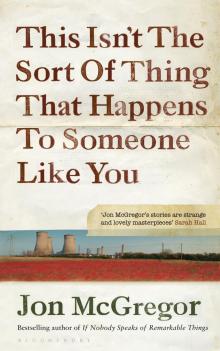 This Isn't the Sort of Thing That Happens to Someone Like You
This Isn't the Sort of Thing That Happens to Someone Like You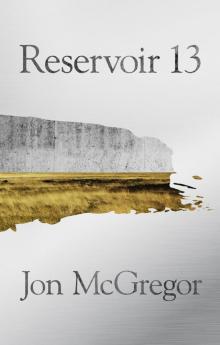 Reservoir 13
Reservoir 13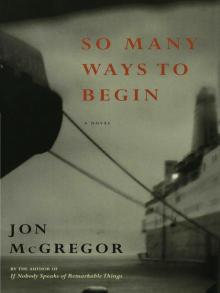 So Many Ways to Begin
So Many Ways to Begin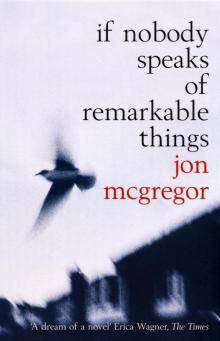 If Nobody Speaks of Remarkable Things
If Nobody Speaks of Remarkable Things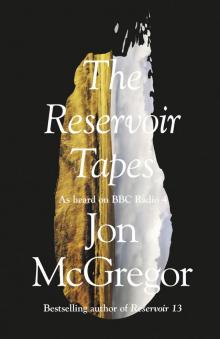 The Reservoir Tapes
The Reservoir Tapes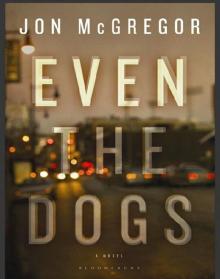 Even the Dogs: A Novel
Even the Dogs: A Novel